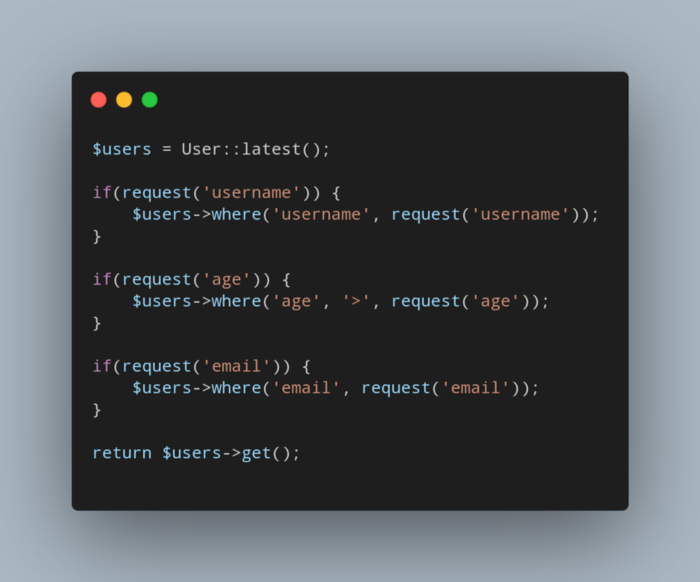
How To Filter Your Eloquent Queries Based on URL Query String in Laravel Like a Pro
Mehrad Sadeghi • July 31, 2020
Describing the Problem
You have probably faced the situation where you needed to filter your query based on given parameters in url query-string and after developing the logics, You’ve had a code-base like what we can in the above image.
This approach works, But it’s not a good practice.
When the number of parameters starts to grow, The number of these kind of if statements also grows and your code gets huge and hard to maintain.
Also it’s against the Open/Closed principal of SOLID principles, Because when you have a new parameter, You need to get into your existing code and add a new logic (which may breaks the existing implementations).
So we have to design a way to make our filters logics separated from each other and apply them into the final query, which is the whole idea behind the package I wrote for Laravel.
Laravel Filter Query String
- First you need to install the package:
$ composer require mehradsadeghi/laravel-filter-querystring
- Then you should
usetheFilterQueryStringtrait in your model, And define$filtersproperty which can be consist of available filters or your custom filters.
use Mehradsadeghi\FilterQueryString\FilterQueryString;
class User extends Model
{
use FilterQueryString;
protected $filters = [];
...
}
- Then you need to use
filter()method in your eloquent query. For example:
User::select('name')->filter()->get();
Available Methods
- Sort
- Comparisons
- In
- Like
- Where clause
For the purpose of explaining each method, Imagine we have such data in our users table:

And assume our query is something like this:
User::filter()->get();
Sort
Sort is the equivalent to order by sql statement which can be used flexible in FilterQueryString:
Conventions:
?sort=field
?sort=field,sort_type
?sort[0]=field1&sort[1]=field2
?sort[0]=field1&sort[1]=field2,sort_type
?sort[0]=field1,sort_type&sort[1]=field2,sort_type
In User.php
protected $filters = ['sort'];
Single sort
https://example.com?sort=created_at
Output:

Note that when you’re not defining sort_type, It'll be asc by default.
Multiple sorts
https://example.com?sort[0]=age,desc&sort[1]=created_at,desc
Output:

Comparisons
Comparisons are consist of 6 filters:
- greater
- greater_or_equal
- less
- less_or_equal
- between
- not_between
- Conventions:
?greater=field,value
?greater_or_equal=field,value
?less=field,value
?less_or_equal=field,value
?between=field,value1,value2
?not_between=field,value1,value2
In User.php
protected $filters = [
'greater',
'greater_or_equal',
'less',
'less_or_equal',
'between',
'not_between'
];
Example of greater:
https://example.com?greater=age,20
Output:

Example of not_between:
https://example.com?not_between=age,21,30
Output:

In
In clause is the equivalent to where in sql statement.
Convention:
?in=field,value1,value2
In User.php
protected $filters = ['in'];
Example:
https://example.com?in=name,mehrad,reza
Output:

Like
Like clause is the equivalent to like '%value%' sql statement.
Conventions:
?like=field,value
?like[0]=field1,value1&like[1]=field2,value2
In User.php
protected $filters = ['like'];
Single like
https://example.com?like=name,meh
Output:

Multiple likes
https://example.com?like[0]=name,meh&like[1]=username,dar
Output:

Where Clause (default filter)
Generally when your query string parameters are not one of previous available methods, It’ll get filtered by the default filter which is the where sql statement. It's the proper filter when you need to directly filter one of your table's columns.
Conventions:
?field=value
?field1=value&field2=value
?field1[0]=value1&field1[1]=value2
?field1[0]=value1&field1[1]=value2&field2[0]=value1&field2[1]=value2
Assuming we want to filter name, username and age database columns, In User.php
protected $filters = ['name', 'username', 'age'];
Example:
https://example.com?name=mehrad
Output:

Example:
https://example.com?age=22&username=dariush123
Output:

Example:
https://example.com?name[0]=mehrad&name[1]=dariush
Output:

Example:
https://example.com?name[0]=mehrad&name[1]=dariush&username[0]=mehrad123&username[1]=reza1234
Output:

Custom Filters
By custom filters you can define your own methods as filters. This helps with the Open/Closed of SOLID principles, Hence each time a new filter is needed, you don’t have to edit previous filters and you can just write a separate method for it.
Let’s create a custom filter. Assuming you want to create a filter named all_except which retrieves all users except the one that is specified:
In User.php
protected $filters = ['all_except'];
public function all_except($query, $value) {
$query->where('name', '!=', $value);
}
To test our newly added filter:
https://example.com?all_except=mehrad
Output:

Note that your custom defined filters have the most priority which means you can even override available filters.
For example lets change in filter in a way that only accepts 3 values:
In User.php
protected $filters = ['in'];
public function in($query, $value) {
$exploded = explode(',', $value);
if(count($exploded) != 4) {
// throwing an exception or whatever you like to do
}
$field = array_shift($exploded);
$query->whereIn($field, $exploded);
}
Another good example for custom filters are when you don’t want to expose your database table’s column name. For example assume we don’t want to expose that we have a column named username in users table:
In User.php
protected $filters = ['by'];
public function by($query, $value) {
$query->where('username', $value);
}
https://example.com?by=dariush123
Output:

Minor Tip
In order to prevent your model to get messy or populated with filter methods, You can create a trait for it and put everything about filters inside the trait.
You can also take a look at Laravel Filter Query String GitHub repo.
